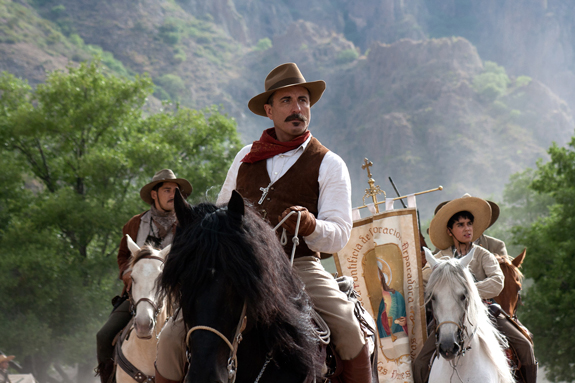by Father Robert Lauder

I ATTENDED a special premiere screening of the new film “For Grater Glory.” As my guests, I brought my friends Mary and Andres Beyra.
The film is about the persecution of the Church in Mexico from 1926 to 1929. Mary and Andres are from Cuba, so they have the firsthand experience of living in a country where the Church is persecuted. Mary is very involved in the new evangelization, and Andres is studying at St. John’s University, Jamaica, for a doctorate in history. He knows the history of the persecution of the Church in Mexico, and he assured me that the film is quite historically accurate.
Because I had heard the film praised by several people, I was looking forward to seeing it. Though I did not dislike the film, I could not give it a completely enthusiastic critique. I am not certain why. Since that special screening I have read at least one review of “For Greater Glory” and also watched the two young critics on the NET TV show “Reel Faith,” David Dicerto and Stephen Greydanus, discuss the film and interview the star, Andy Garcia.
In his comments, David mentioned that it is important that people, who are dissatisfied with most films that are being produced today, do something positive by viewing and supporting “For Greater Glory.” I think of the St. Christopher motto: “It is better to light one candle than to curse the darkness.”
I agree completely with David and decided to give the film another viewing on the chance that my initial disappointment was due more to me than to “For Greater Glory.” For some reason, I had a hunch that the film was considerably better than I initially thought. I played my hunch, and I am glad I did.
Recently, I saw the film again, this time with my two nieces, who are 21 and 18, and their father. Their reaction was unanimous. They loved the film, and I appreciated “For Greater Glory” much more than I did previously. At one point, I thought I would have to swim out of the theater because of the copious tears that my nieces were shedding! It fascinates me that in seeing the film a second time, I saw so much more than I did the first time.
Since 1992, I have viewed almost 250 films that are either classics or near classics. This has happened because of the Friday film festivals that I conduct at Immaculate Conception Center in Douglaston, six films in the fall, six films in the spring. I firmly believe that movies should be taken seriously, that they are much more than a pleasant way to waste time. Just as there are great paintings, symphonies, statues, novels, poems and plays, there are great films. A steady diet of very poor films has to influence a viewer negatively; a steady diet of masterpieces, or films that are nearly masterpieces, has to influence a viewer positively.
When I started the film festival program, I wanted seminarians and others to be exposed to great movies. I had seen all the films that I chose to screen during the festivals, but I wanted others to benefit from viewing them. As soon as I can, I intend to show “For Greater Glory.”
A film is a work of art created by human beings and there is no perfect work of art, though films like “A Man for All Seasons,” “Breaker Morant” and “On the Waterfront,” my favorite film, come close.
“For Greater Glory” is a very good film. Technically, it is first rate. Someone has spent a great deal of money producing it. I was especially impressed by the music, camera work and acting. All the performers are good, and Andy Garcia is excellent.
Thematically, the film is magnificent. One of the themes in the film is the price that some people have to pay for their faith. This is handled very well. Another is centered on what a person can do in order to be receptive and open for God’s gift of faith. I think a third theme is that love between human persons can open someone to love of God.
At this moment in this country, the Church is the object of strong criticism in the media. When a favorable, balanced view of the Church is presented in the media, I believe that we should support and encourage those responsible for that presentation. [hr] Father Robert Lauder, a priest of the Diocese of Brooklyn and philosophy professor at St. John’s University, Jamaica, writes a weekly column for the Catholic Press.
